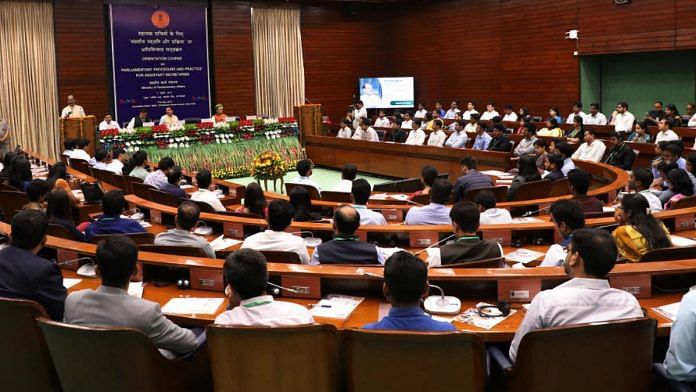The Narendra Modi government’s proposal to amend the All India Services Rules to allow for the central deputation of officers whose services are required by the Centre has led to the proverbial war of words between the Department of Personnel and Training and the state governments, with many chief ministers making it a case of federal encroachment in the domain of states.
However, there is a larger question — why should there be any discretion at all, either of the state or the central government? For even the latter is not making a policy for officers working in rotation between the Union and the states. All it is saying is that when the Centre wants a ‘particular officer’, they will be called to hold an appointment at the Centre only, irrespective of the views of the cadre controlling authority in the state.
The idea behind an ‘all-India’ service
Let us, therefore, examine the logic and the working of the AIS, both at the time of its creation by Sardar Vallabhbhai Patel and at the recommendation of the States Reorganization Commission and the various Administrative Reforms Commissions. The logic for an all-India service is that its officers should rotate between the Centre and the states to which they are allocated. Thus, in an ideal scenario, an AIS officer should work for the state government for the first 10 years and then rotate between the Centre and the state government — five years for the former and three for the latter.
At every stage, the tenure at the Centre should be for five years. Until an officer becomes an additional secretary to the Government of India, it should be three years with the state government. When the officer reaches the apex scale, they should be available for posting to the GoI. This arrangement will ensure that an officer would spend one half of their time in the state and the other in the GoI.
In order to ensure complete transparency and also to protect and strengthen the all-India character of the three services (the Indian Administrative Services, the Indian Police Services, and the Indian Forest Services), it should be mandatory that an officer is posted to the GoI on the completion of 10 years in the state, irrespective of the position they hold. Often, younger officers resist coming to the Centre when the going is good in the state governments and avoid being posted at the level of deputy secretary/director, or they come only as private secretaries to the ministers.
A major reform would be to give the minister an option of choosing any one of the deputy secretaries/directors within the ministry itself. This will not only usher transparency but also prevent ‘discretion’ and perceived nepotism.
Also read: Centre’s proposed amendments to AIS Rules hurt cooperative federalism-Telangana CM
A choice to not work for GoI
What happens to officers who do not wish to work for the Centre after 10 years? Well, they should cease to be AIS officers and be allowed to continue their service as state civil servants, for that is what they have opted to become with their refusal to work for the GoI. This may appear to be harsh, but obviously, when an aspirant takes the examination to be an AIS officer, they are well aware of the consequences of rotational postings between the Centre and the state.
This leads us to a discussion on empanelment, which again goes against the entire spirit of the AIS. When an officer is not empanelled as a joint secretary in the 16th year of their service, they cease to be an AIS officer, for the option of working at the Centre is lost forever. As not more than 50 per cent of officers in a batch are currently being empanelled, the system ends up demotivating half the cadre strength of the three services for half of their working life with the government.
Many take it stoically; others are willing to bring in all kinds of pressure to make it to the list. Officers also sink into a state of cynical despair, raving and ranting against the Centre from which they have little hope and are left at the mercy of the state CMs. In this case too, the letters IAS, IPS, and IFS should be dropped, and the officers given a choice to quit or opt for state service.
In fact, the entire exercise is futile. Endless hours are devoted by the DoPT, the Ministry of Home Affairs (MHA), and the Ministry of Environment, Forest and Climate Change (MoEF) to empanel officers at the level of joint secretaries, additional secretaries, secretary equivalents, and secretaries. That the system is ineffective is clear from the fact that we have had cabinet secretaries who were not empanelled at the level of joint secretaries, empanelled secretaries who have not retired as secretaries, and secretary equivalents who have become full secretaries to the government.
Last, but not least, is the discretion of the state government for cadre transfer after marriage and interstate deputation. The policy on this should also be clear, transparent, and non-discretionary. If, and only if, these conditions are fulfilled will the All India Services live up to the expectations that Sardar Patel had from them.
Sanjeev Chopra is a historian and Festival Director of Valley of Words. Till recently, he was the Director of the Lal Bahadur Shastri National Academy of Administration. He tweets @ChopraSanjeev. Views are personal.
This article is the fifth part of the ‘State of the State‘ series that analyses policy, civil services, and governance in India.
(Edited by Humra Laeeq)



